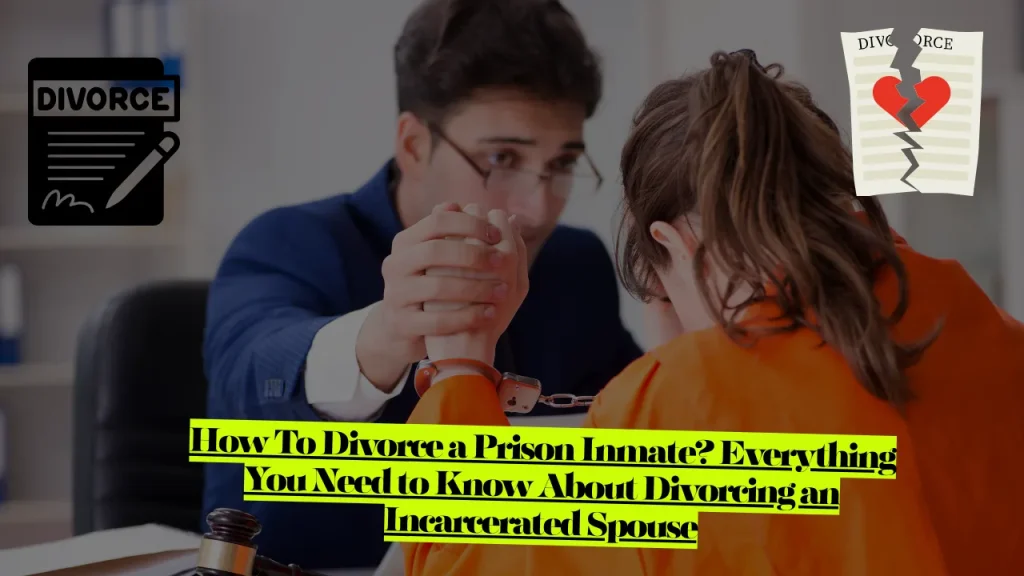How to Divorce a Prison Inmate? Divorce Behind Bars Things You Need to Know About Divorcing an Incarcerated Spouse
Over 1.9 million Americans sit in prisons and jails today—more than Rhode Island’s entire population. Behind those numbers are thousands of marriages facing an impossible question: Can you divorce someone who’s locked away?
The answer is yes. But it’s complicated.
Can You Divorce Someone in Prison?
Yes, you can absolutely divorce an incarcerated spouse. Some people mistakenly believe divorce isn’t possible while a spouse is imprisoned, but this is completely untrue. Your spouse’s incarceration doesn’t freeze your marriage or your right to end it.
The process follows standard divorce procedures with specific modifications for incarceration. Both spouses—whether in prison or not—retain the legal right to file for divorce.
How Divorcing an Inmate Differs From Standard Divorce
The biggest difference? Serving divorce papers to someone behind bars.
You’ll need to contact the prison to understand their specific procedures for serving legal papers on inmates. Every correctional facility has its own rules. Some require certified mail. Others need process servers to appear in person.
Here’s what makes it unique:
Service of Process: Instead of serving papers at a home address, you coordinate with prison administration. When someone is in prison, service becomes easier because the inmate is reliably “at home,” allowing deputies to enter the facility for document delivery.
Court Appearances: Many courts allow incarcerated individuals to attend hearings via teleconference or video conference, though this varies by state and judicial discretion.
Communication Barriers: Direct communication with your incarcerated spouse happens through prison mail, monitored phone calls, or during visitation hours—all subject to facility rules.
Related Article: Atm Class Action Lawsuit, NYCB $1.23M ATM Fee Payout Deadline Approaching Fast New York Community Bank Customers Could Get Paid

State-by-State Variations: What You Must Know
Divorce laws differ dramatically by state, especially regarding incarcerated spouses.
Fault-Based Grounds
Some states recognize incarceration as a fault-based ground for divorce:
New York: A spouse must have been in prison for three or more consecutive years after the marriage began to use imprisonment as grounds for divorce.
Texas: Allows divorce based on conviction of a felony and imprisonment for at least one year in a state or federal penitentiary.
Virginia: When a spouse was convicted of a felony after marriage and is incarcerated for more than one year, fault-based grounds apply, eliminating the one-year separation requirement.
No-Fault Divorce
Most states, including California, allow no-fault divorce. California considers one spouse being in prison as sufficient evidence of irreconcilable differences.
Special State Requirements
Virginia’s Unique Rule: Incarcerated spouses are considered to have a “disability,” entitling them to a Guardian ad litem (GAL). You typically pay for this GAL unless your spouse was convicted after marriage, you or your children were victims, and they’re incarcerated for over one year.
New Jersey: Requires a spouse to be incarcerated for at least 18 months before filing for divorce on imprisonment grounds.

Step-by-Step: How to Divorce an Incarcerated Spouse
1. Locate Your Spouse
Find out exactly where they’re incarcerated using your state’s Department of Corrections inmate locator. You’ll need your spouse’s inmate number for the paperwork.
2. Check Your State’s Laws
Research your state’s specific requirements for serving papers on inmates and grounds for divorce.
3. Prepare Divorce Papers
File a petition for divorce in the county where you or your spouse resides. Incarceration in a California jail or state prison for three or more months automatically meets county residency requirements.
4. Serve the Papers
Contact the prison to learn their procedures for serving legal papers. This might involve certified mail, process servers, or coordinating with prison officials.
5. Wait for Response
The defendant/inmate has 30 days to respond, just as if they were outside prison. All subsequent paperwork can be mailed directly to them.
6. Proceed Based on Response
If your spouse doesn’t respond or contests, you may be eligible for a default divorce judgment, allowing the court to proceed without their participation.
Child Custody and Visitation During Incarceration
Physical custody: A parent in prison cannot have physical custody, though they may retain legal decision-making rights.
Courts consider:
- Length of the sentence
- Nature of the crime
- The child’s best interests
- Relationship between child and incarcerated parent
Some courts allow supervised visitation, letter exchanges, or phone calls, depending on circumstances.
Child Support: What Happens to Payments?
An incarcerated person can be ordered to pay child support if they have income. However, judges usually won’t order someone in jail or prison to pay child support until they’re released.
Prison wages are minimal—between $0.26 and $2.00 per hour in New Jersey before deductions. Inmates can earn money with prison jobs, and those funds can be used to pay child support and spousal support.
Important: Child support modification is generally not retroactive to incarceration date. File for modification immediately to avoid mounting arrears.
How Much Does It Cost?
Divorce costs vary by state and complexity. Standard filing fees range from $200-$500. Additional costs include:
- Attorney fees (if you hire one)
- Process server fees
- Guardian ad litem costs (in states like Virginia) which you typically pay
- Court costs for contested issues
Some states waive fees for low-income filers. Check your local court for fee waiver applications.
Timeline: How Long Does It Take?
Expect 6-12 months minimum, depending on:
- Whether it’s contested or uncontested
- State-specific waiting periods (Texas mandates a 60-day waiting period from filing to finalization)
- Court scheduling
- Complexity of assets and custody arrangements

Real-Life Example: High-Profile Prison Divorce
Harvey Weinstein married in 2007 and reached an out-of-court settlement with his wife in 2018 during his sexual assault trials. Despite having a prenup, legal experts believe she secured a $20 million deal because of the negative climate surrounding him.
This demonstrates that even with prenuptial agreements, circumstances can dramatically affect divorce settlements.
Property Division and Asset Management
Texas uses community property laws, meaning all property acquired during marriage is jointly owned and divided equitably. Incarceration doesn’t change this principle, though courts may consider the non-incarcerated spouse’s needs.
Challenges:
- If marital assets were depleted or incurred as part of criminal activities leading to incarceration, courts may consider these factors in division
- Hidden assets can be harder to discover when one spouse is incarcerated
- Retirement accounts, pensions, and other benefits remain subject to division
What If Your Spouse Contests the Divorce?
An incarcerated spouse cannot prevent the divorce. However, they can contest terms regarding:
- Property division
- Child custody arrangements
- Spousal support
- Asset distribution
Incarcerated spouses who object can attempt to stall or delay proceedings, potentially succeeding in slowing the divorce with skilled legal representation.
Can an Inmate File for Divorce?
Yes, inmates have the right to initiate divorce proceedings by filing necessary legal documents, though they may face logistical challenges in obtaining legal representation and participating in hearings.
An incarcerated person is not entitled to a lawyer for civil cases like divorce, unlike criminal cases. They must rely on prison legal services or private attorneys if they have the means.
FAQ: Common Questions About Divorcing Incarcerated Spouses
Q: Do I need to wait until my spouse is released?
No. You can file for divorce at any time during their incarceration.
Q: What if I don’t know where my spouse is incarcerated?
Use your state’s Department of Corrections inmate locator or the Federal Bureau of Prisons database to find them.
Q: Can my spouse attend court hearings?
Depends on the state and judge’s discretion. Many courts allow video or teleconference participation.
Q: Will my spouse’s criminal conviction affect custody?
Courts consider the nature of the conviction, sentence length, and the child’s best interests when making custody decisions.
Q: Do I need a lawyer?
Not required, but strongly recommended for contested divorces or complex asset division.
Resources and Next Steps
Find Your State’s Requirements:
- State Court Websites Directory
- Your state’s Department of Corrections
- State Bar Association family law sections
Bureau of Prisons Inmate Locator:
Visit BOP.gov to locate federal inmates.
Legal Aid:
Contact your local legal aid office if you qualify for free representation based on income.
Final Thoughts
Divorcing an incarcerated spouse adds complexity but doesn’t prevent you from moving forward. While having a spouse in jail changes the divorce process and can make it more complicated, you shouldn’t be discouraged from seeking a divorce simply because your spouse is incarcerated.
Understanding your state’s specific procedures, properly serving divorce papers, and considering custody and financial implications will help you navigate this difficult situation with confidence.
Disclaimer: This article provides general information only and does not constitute legal advice. Consult with a qualified family law attorney in your state for guidance specific to your situation.
About the Author

Sarah Klein, JD, is a former family law attorney with over a decade of courtroom and mediation experience. She has represented clients in divorce, custody cases, adoption, Alimony, and domestic violence cases across multiple U.S. jurisdictions.
At All About Lawyer, Sarah now uses her deep legal background to create easy-to-understand guides that help families navigate the legal system with clarity and confidence.
Every article is based on her real-world legal experience and reviewed to reflect current laws.
Read more about Sarah
